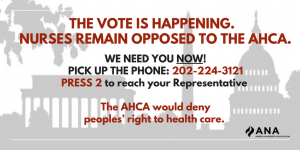As I covered previously, the U.S. House of Representatives on May 4, 2017, recklessly passed the American Health Care Act by a 217-213 vote. They did so with little transparency, thoughtful debate, or meaningful stakeholder input. Crucially, they also passed this bill without even knowing its potential impacts on the ability of Americans to access quality health care services. Based on an analysis of the previous version of the American Health Care Act, however, this bill would likely result in the loss of health care coverage for 24 million Americans, potential restrictions for 15 million Americans with pre-existing conditions, and $800 billion+ in Medicaid funding slashed over ten years.
According to a report released on May 18 by Avalere Health, children would be significantly impacted by the proposed Medicaid changes in the American Health Care Act. Funding for children on Medicaid would be slashed by up to $43 billion over ten years under a per capita cap plan, while it would be slashed by up to$78 billion under a block grant plan (read more about block grants here). While Medicaid is often discussed in terms of an entitlement and with a particular focus on the controversial Medicaid expansion, its impact on children’s health care does not receive nearly as much attention. Children represent the largest group of enrollees covered by Medicaid, and the program covers nearly half of all births in the United States. Medicaid provides crucial health care services to children and, under Early and Periodic, Screening, Diagnostic, and Treatment (EPSDT) requirements, these children cannot be denied necessary care. This health care (or lack of) impacts the health of the child for the rest of his or her life; a healthy child is more likely to grow into a healthy adult.
As we wait for the American Health Care Act to move to the U.S. Senate for consideration, the American Nurses Association encourages all 100 senators to consider the stakes of this bill for the health of our nation’s children. Access to quality health care for children not only ensures that they are healthy in the here and now, but also ensures that we are raising a healthy and productive generation of Americans who are able to lead productive lives to the best of their abilities. ANA also urges the Senate to reject the flawed American Health Care Act – which flies in the face of our stated health care reform principles – and to undertake a deliberative, thoughtful, and transparent process which produces a piece of legislation which ensures quality health care access to all Americans.
For more information on the latest from ANA’s Capitol Hill efforts, continue to follow us on our RNAction page and ANA’s Capitol Beat.

